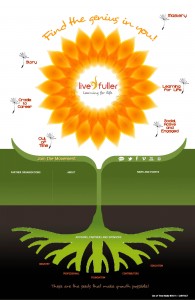 I am in rustic Rochester, Vermont, a contestant in Pitch Week II. I am deep in the throes of this midsummer nights competition–in the running for the publishing trifecta of a book deal, agent and publicist.
I am in rustic Rochester, Vermont, a contestant in Pitch Week II. I am deep in the throes of this midsummer nights competition–in the running for the publishing trifecta of a book deal, agent and publicist.
As part of the contest, I am presenting my vision for a rebirth of learning based on the resonance of my story Out of Time–a plan for every child to achieve his fullest potential. A renewal in modern society of transdicisplinary learning has the potential to spawn the same impulse towards innovation, illumination and flowering of genius that characterized the Renaissance: Live Fuller.
The gist: a revival of Renaissance/Humanist learning and discovery based on modern science of how children learn, grow and thrive offers a chance for every child to discover, nurture and be supported in finding her own source of genius.
I contend that stories have the power to evoke such potential for self-discovery and inspire children to find and explore their unique talents and potential to contribute to the world. And Out of Time, in all its forms–novel, screenplay, interactive storytelling, and digital learning tool–can be the portal.
During the course of the week-long publishing competition, I have the great good fortune of staying in the Ralph Ellison room at the When Words Count Retreat. Of course, Ellison work was influential during the Harlem Renaissance—a 20th century flowering of thoughts and ideas for a particular community long oppressed. Not a coincidence, as far as I’m concerned.
As I scan the works of the author of The Invisible Man, I read the back book jacket of his collected stories, Flying Home.
I find his words evocative:
“Back in the thirties, when I was a music student in the South, I was moved to great agonies of empathy by three novels. One of these was Wuthering Heights, another was Jude the Obscure and the other was Crime and Punishment. While I was reading these works I felt such a compelling identification with their respective heroes that I literally suffered through their every trial and exalted in their every triumph. . . . I missed none of the bolder actions and there are still memory traces of them in my throat which were put there by the poignant and tragic developments of these fictions. . . . And the fact that they could so take me out of myself and transport me to a more intense world of feeling and acting, yes, and thinking, intrigued me more than I realized at the time.”
At its best, reading—and fiction in particular—has this magical power to move us to “great agonies of empathy.” And what better to teach our children—in our world of widening divisions and fissions on a global scale—than the pleasurable agony of knowing we all share the same dreams and fears, the same flesh and blood, and the same capacity to draw together through our shared experiences?
Can story create resonance that allows children to jump into learning and find that same source of inspiration? Once that seed is planted, can we, as a society, water it, nurture it into full flower, and then let it grow?
It is to this idea that I dedicate Out of Time: that we all embrace the goal to “live fuller”, to wake up to a world in dire need of revival. More than any time in recent memory, today’s complex and interconnected world requires a Renaissance of ideas, inspiration, creativity and problem solving.
And it is the coming generations that will be charged with undertaking that renewal–or witness our demise.
Now is the moment to plant the seeds of empathy, watch them take root, and strengthen our capacity to draw together in mutual understanding and compassion for ourselves and others with all our strengths and foibles.
Can a story Out of Time spark a movement?
